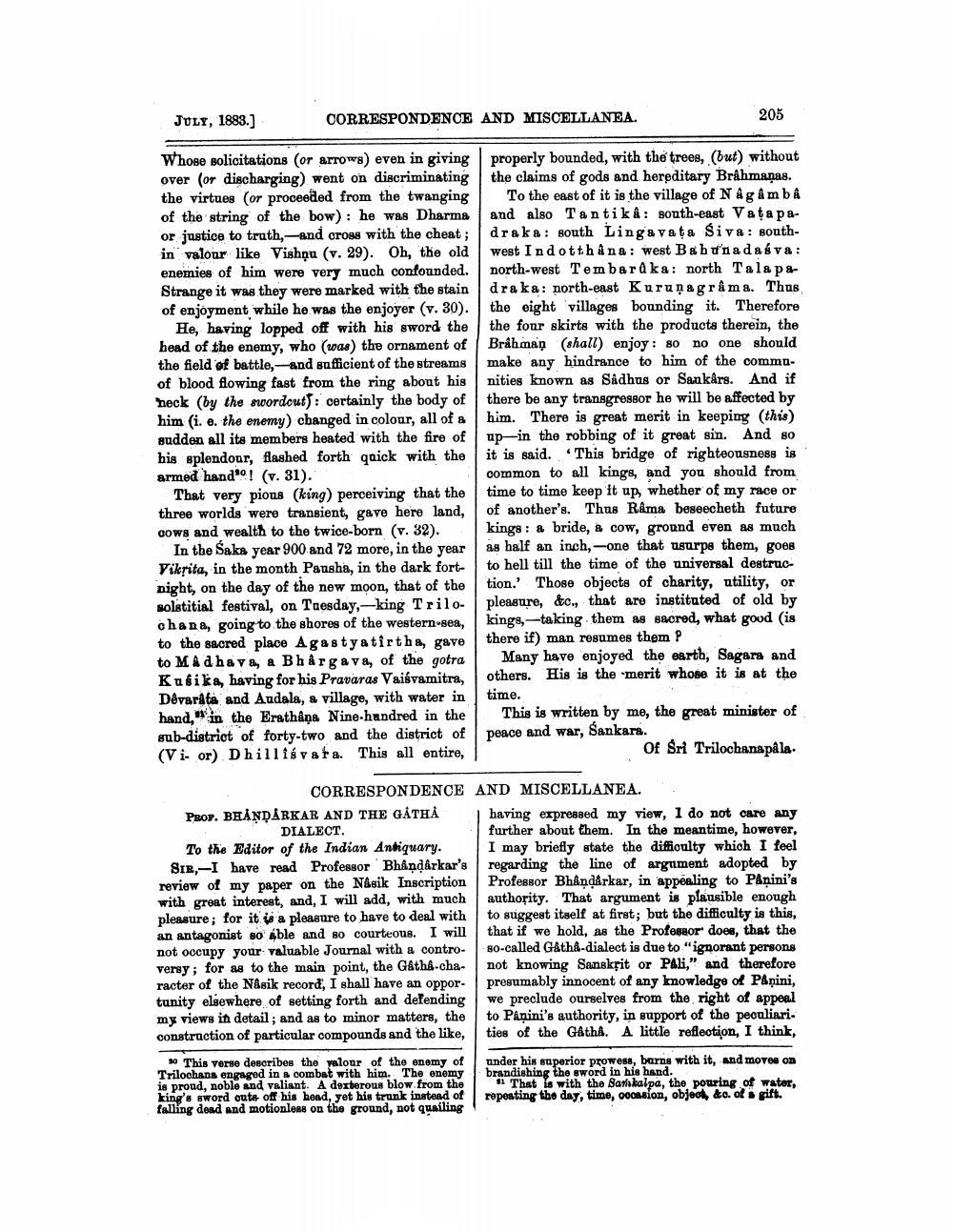________________
CORRESPONDENCE AND MISCELLANEA.
JULY, 1883.]
Whose solicitations (or arrows) even in giving over (or discharging) went on discriminating the virtues (or proceeded from the twanging of the string of the bow): he was Dharma or justice to truth,-and cross with the cheat; in valour like Vishnu (v. 29). Oh, the old enemies of him were very much confounded. Strange it was they were marked with the stain of enjoyment while he was the enjoyer (v. 30).
He, having lopped off with his sword the head of the enemy, who (was) the ornament of the field of battle,-and sufficient of the streams of blood flowing fast from the ring about his neck (by the swordcut): certainly the body of him (i. e. the enemy) changed in colour, all of a sudden all its members heated with the fire of his splendour, flashed forth quick with the armed hand! (v. 31).
That very pious (king) perceiving that the three worlds were transient, gave here land, cows and wealth to the twice-born (v. 32).
In the Saka year 900 and 72 more, in the year Vikrita, in the month Pausha, in the dark fortnight, on the day of the new moon, that of the solstitial festival, on Tuesday,-king Trilochana, going to the shores of the western-sea, to the sacred place Agastyatirtha, gave to Madhava, a Bhargava, of the gotra Kusika, having for his Pravaras Vaisvamitra, Dêvarata and Audala, a village, with water in hand, in the Erathâna Nine-hundred in the sub-district of forty-two and the district of (Vi- or) Dhillisvara. This all entire,
CORRESPONDENCE PROF. BHANDARKAR AND THE GATHA DIALECT.
To the Editor of the Indian Antiquary. SIR,-I have read Professor Bhandarkar's review of my paper on the Nasik Inscription with great interest, and, I will add, with much pleasure; for it is a pleasure to have to deal with an antagonist so able and so courteous. I will not occupy your valuable Journal with a controversy; for as to the main point, the Gâthâ-character of the Násik record, I shall have an opportunity elsewhere of setting forth and defending my views in detail; and as to minor matters, the construction of particular compounds and the like,
30 This verse describes the valour of the enemy of Trilochana engaged in a combat with him. The enemy is proud, noble and valiant. A dexterous blow from the king's sword outs off his head, yet his trunk instead of falling dead and motionless on the ground, not quailing
205
properly bounded, with the trees, (but) without the claims of gods and hereditary Brahmanas.
To the east of it is the village of N &gâmbâ and also Tantika: south-east Vaṭapadraka: south Lingavata Siva: southwest Indotthâna: west Babu'nadasva: north-west Tembaraka: north Talapadraka: north-east Kurunagrama. Thus the eight villages bounding it. Therefore the four skirts with the products therein, the Brahman (shall) enjoy: so no one should make any hindrance to him of the communities known as Sådhus or Sankârs. And if there be any transgressor he will be affected by him. There is great merit in keeping (this) up-in the robbing of it great sin. And so it is said. This bridge of righteousness is common to all kings, and you should from time to time keep it up, whether of my race or of another's. Thus Râma beseecheth future kings: a bride, a cow, ground even as much as half an inch,-one that usurps them, goes to hell till the time of the universal destruction. Those objects of charity, utility, or pleasure, &c., that are instituted of old by kings, taking them as sacred, what good (is there if) man resumes them ?
Many have enjoyed the earth, Sagara and others. His is the merit whose it is at the time.
This is written by me, the great minister of peace and Sankara. war,
Of Sri Trilochanapala.
AND MISCELLANEA.
having expressed my view, 1 do not care any further about them. In the meantime, however, I may briefly state the difficulty which I feel regarding the line of argument adopted by Professor Bhandarkar, in appealing to Panini's authority. That argument is plausible enough to suggest itself at first; but the difficulty is this, that if we hold, as the Professor does, that the so-called Gâthâ-dialect is due to "ignorant persons not knowing Sanskrit or Pali," and therefore presumably innocent of any knowledge of Panini, we preclude ourselves from the right of appeal to Panini's authority, in support of the peculiarities of the Gâthâ. A little reflection, I think,
under his superior prowess, barns with it, and moves on brandishing the sword in his hand.
1 That is with the Sankalpa, the pouring of water, repeating the day, time, occasion, object, &c. of a gift.




